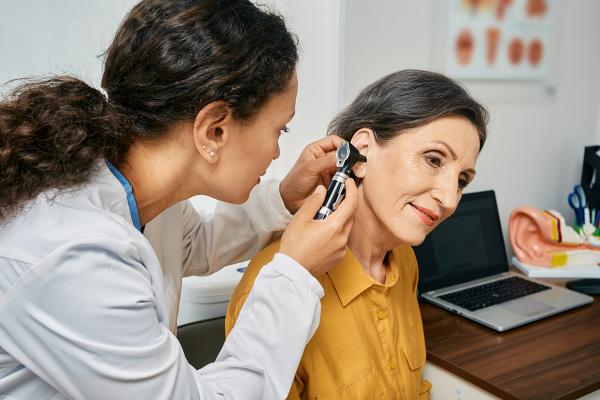
EPIC Hearing Healthcare helps members access hearing exams, hearing aids and more. Sign in to learn more and check eligibility.
When it comes to hearing aids, you have options. Here are the key facts about prescription and over-the-counter devices — and help on finding the right one for you.

Hearing loss is a fact of life for many Americans. It’s estimated that more than 30 million people in the United States ages 18 and older have trouble hearing well.1 And as people get older, hearing loss can get worse.2 Many people start to notice age-related hearing loss in their 50s and 60s.
Hearing aids may help. And these devices now come in 2 main types. There are prescription hearing aids. And there are over-the-counter (OTC) ones that you can buy directly, without seeing a hearing care professional.3
Understanding how each type works and their differences can help you weigh your options. So, it makes sense to find out what prescription and OTC hearing aids have to offer. Here are important facts to consider.

EPIC Hearing Healthcare helps members access hearing exams, hearing aids and more. Sign in to learn more and check eligibility.
“There’s not one cutoff to determine when to get a hearing aid. It’s individual to each person,” says Jennifer Thomson, Au.D. She’s the assistant director of audiology at Columbus Speech and Hearing in Columbus, Ohio. There are some signs that you might need a hearing exam and consultation though.
These include the following, says Thomson:
The first step is typically getting your hearing checked with a hearing care professional such as an audiologist or a hearing instrument specialist. Then they can recommend treatment, including hearing aids.
Even if you’re interested in OTC hearing aids, it may be a good idea to get a hearing exam first, recommends the American Academy of Audiology.4 That way, a hearing care professional can help determine if they’re a good option for you.
Prescription hearing aids are good for many kinds of hearing loss, including severe hearing loss.3 There are 2 main types: one type rests behind your ear and the other sits inside your ear.
The basics: A hearing care professional prescribes these after you have a hearing test. The exam helps the hearing care professional discover the reasons behind your hearing loss, and how extensive it is. Then they can help you pick the right hearing aids.
People who get prescription hearing aids have a lot of options when it comes to design and style.2 Other facts to know:
If you’re a member of EPIC Hearing Healthcare, you get up to 3 follow-up visits at no extra cost — and 60 days to try out your new prescription hearing aids. Learn more.
OTC hearing aids are intended for people with perceived mild-to-moderate hearing loss.4 They can be a good option for people who only need hearing help in some situations (such as in a crowded restaurant).
The basics: You can buy these devices in stores and online without a prescription.8 And you don’t need to have a hearing exam. Other facts to know:
Another important consideration? “Check to see if there is a return policy, so you can bring the OTC hearing aid back if you’re having trouble with it or they’re not working well enough,” says Thomson.
No matter which kind of hearing aids you get, it’s a good idea to check your hearing on a regular basis, recommends Thomson. That way, if there are minor changes to your hearing, a hearing care professional may be able to reprogram them. Or even advise you if you need a stronger pair.
It’s all part of taking care of your health. Hearing well brings its own rewards. “When you have your hearing, you can stay engaged and keep active, without having to pull away from things you like to do,” says Thomson. That can make every day more enjoyable.
Sources
Information is for educational purposes only and is not a substitute for the advice of a licensed medical provider. Consult your provider prior to making changes to your lifestyle or health care routine.
Hearing aids purchased in the Silver technology level will receive 1 follow-up visit.